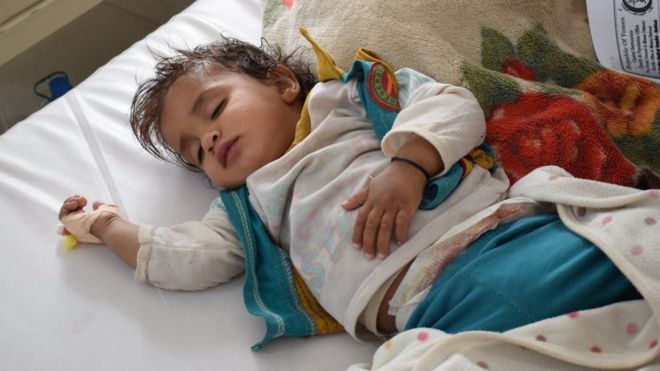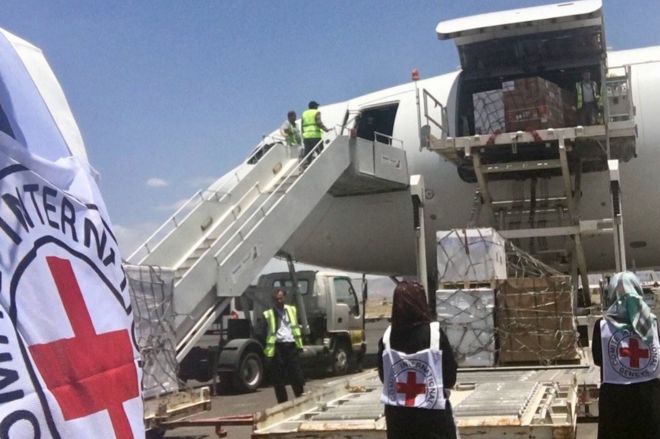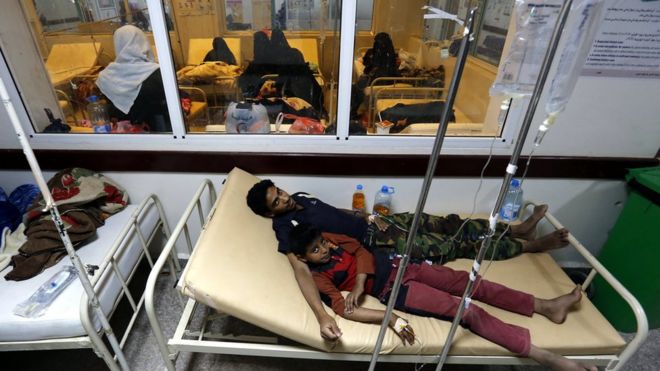The ICRC has flown in five charter planes carrying large quantities of chlorine, IV fluids and other medical supplies in recent days. ICRC health staff and engineers are supporting 17 cholera treatment facilities around the country. We are improving hygiene and sanitation conditions, and raising cholera awareness among the general public.

 We provide what we can, where we can. But even with similar work being done by Médecins Sans Frontières (MSF) and the World Health Organisation (WHO), there are simply too many people in need. Children dying in hospital hallways. Four sick people
We provide what we can, where we can. But even with similar work being done by Médecins Sans Frontières (MSF) and the World Health Organisation (WHO), there are simply too many people in need. Children dying in hospital hallways. Four sick people  Overburdened medical staff do what they can but often do not have enough supplies or knowledge - two reasons cholera has spread so fast.The cholera outbreak has infected more than 200,000 people across Yemen, and it appears that 500,000 could eventually become sick. More than 1,300 people have already died.The disease should not be so ferocious. Preventing cholera is pretty simple in theory: wash your hands with clean water, drink clean water, and eat food that has been boiled or cooked. But clean water in Yemen is a luxury. Municipal workers in Sanaa have not been paid in months. And so we have no electricity, rubbish piling high in the street, and a crippled water system. The sewer system stopped working on 17 April. Ten days later, cholera hitHospital systems have collapsed, with medical staff no longer paid. The staff who remain are overwhelmed. My organisation, the International Committee of the Red Cross (ICRC), is currently providing care to nearly one in five cholera cases in the country - the biggest single provider of case management and infection control. We are impressed with the Yemeni ministry of health staff, who work day and night without pay or protection, exposing themselves and their families to sickness. The dedication is beyond commendable.To help motivate - or say thank-you - the ICRC gave a modest Eid al-Fitr bonus at the end of Ramadan. But we know it is not enough.
Overburdened medical staff do what they can but often do not have enough supplies or knowledge - two reasons cholera has spread so fast.The cholera outbreak has infected more than 200,000 people across Yemen, and it appears that 500,000 could eventually become sick. More than 1,300 people have already died.The disease should not be so ferocious. Preventing cholera is pretty simple in theory: wash your hands with clean water, drink clean water, and eat food that has been boiled or cooked. But clean water in Yemen is a luxury. Municipal workers in Sanaa have not been paid in months. And so we have no electricity, rubbish piling high in the street, and a crippled water system. The sewer system stopped working on 17 April. Ten days later, cholera hitHospital systems have collapsed, with medical staff no longer paid. The staff who remain are overwhelmed. My organisation, the International Committee of the Red Cross (ICRC), is currently providing care to nearly one in five cholera cases in the country - the biggest single provider of case management and infection control. We are impressed with the Yemeni ministry of health staff, who work day and night without pay or protection, exposing themselves and their families to sickness. The dedication is beyond commendable.To help motivate - or say thank-you - the ICRC gave a modest Eid al-Fitr bonus at the end of Ramadan. But we know it is not enough.
No comments:
Post a Comment